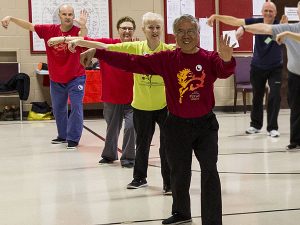Improve Motor Ability in Parkinson’s Disease Patients with Tai Chi
By John M. de Castro, Ph.D.
“Tai chi, a balance-based exercise, has been shown to improve strength, balance, and physical function and to prevent falls in older adults. . . it may also improve axial symptoms of Parkinson’s disease, such as postural stability.” – Fuzhong Li
Parkinson’s Disease (PD) is an incurable progressive degenerative disease of the central nervous system. The condition is caused by the death of nerve cells in the brain that produce the neurotransmitter dopamine. There are around seven million people worldwide and one million people in the U.S. living with PD and about 60,000 people are diagnosed with PD every year. PD is associated with aging as most patients are diagnosed after age 50. In fact, it has been speculated that everyone would eventually develop PD if they lived long enough.
Its physical symptoms include resting tremor, slow movements, muscle rigidity, problems with posture and balance, loss of automatic movements, and slurring of speech. PD itself is not fatal but is often associated with related complications which can reduce life expectancy, such as falls, choking, and cardiovascular problems. PD also has psychological effects, especially cognitive decline, anxiety, and depression. Balance is a particular problem as it effects mobility and increases the likelihood of falls, restricting activity and reducing quality of life.
There are no cures for Parkinson’s Disease (PD) or even treatments to slow its progression. There are only treatments that can produce symptomatic relief. So, there is a need to discover new and different treatments. Mindfulness training has been found to improve the psychological symptoms and the quality of life with PD patients. In addition, combinations of mindfulness and exercise such as Tai Chi and yoga practices have been shown to improve the symptoms of Parkinson’s Disease. The evidence is accumulating. So, it makes sense to step back and summarize what has been learned about the effectiveness of Tai Chi practice for the treatment of Parkinson’s Disease.
In today’s Research News article “The Impact of Tai Chi on Motor Function, Balance, and Quality of Life in Parkinson’s Disease: A Systematic Review and Meta-Analysis.” (See summary below or view the full text of the study at: https://www.ncbi.nlm.nih.gov/pmc/articles/PMC7814935/ ) Yu and colleagues review, summarize, and perform a meta-analysis of the effectiveness of Tai Chi practices for treatment of Parkinson’s Disease. They identified 17 randomized controlled trials containing a total of 951 patients with Parkinson’s Disease.
They report that the published research found that Tai Chi practice was safe and effective producing significant increases in the patient’s gait velocity, balance confidence, timed up and go, and balance. Hence, the published research found highly significant evidence that Tai Chi practice results in improvements in movements and balance in patients with Parkinson’s Disease.
The improvements in balance are reflected in the previous observations that Tai Chi practice reduces the likelihood of falls in the elderly and in patients with Parkinson’s Disease. Since, falls are a significant source of disability and even death, the improvement in balance alone justifies the recommendation of Tai Chi practice for patients with Parkinson’s Disease.
So, improve motor ability in Parkinson’s Disease patients with Tai Chi.
“The incorporation of Tai Chi in the daily life of Parkinson’s disease patients allowed them to stay functionally and physically active.” – Alison Rodriguez
CMCS – Center for Mindfulness and Contemplative Studies
This and other Contemplative Studies posts are available on Twitter @MindfulResearch
Study Summary
Yu, X., Wu, X., Hou, G., Han, P., Jiang, L., & Guo, Q. (2021). The Impact of Tai Chi on Motor Function, Balance, and Quality of Life in Parkinson’s Disease: A Systematic Review and Meta-Analysis. Evidence-based complementary and alternative medicine : eCAM, 2021, 6637612. https://doi.org/10.1155/2021/6637612
Abstract
Objective
Parkinson’s disease adversely affects function and quality of life, leading to increased mortality. The practice of Tai Chi has been associated with multifaceted improvements in health-related fitness. Considering the limited number of clinical studies included in previous reviews, inconsistent methodological quality, and inconclusive results, this meta-analysis aims to assess the effects of Tai Chi in patients with Parkinson’s disease.
Method
Four English language databases and four Chinese databases were systematically searched for existing randomized controlled trials (RCTs) of Tai Chi in Parkinson’s disease from database inception through August 1, 2020. Methodological quality was appraised with the Cochrane Risk of Bias tool. A meta-analysis of comparative effects was performed using the Review Manager v.5.3 software.
Results
Seventeen published RCTs totaling 951 subjects were included. Results showed that Tai Chi has a statistically significant effect on the outcomes of gait velocity, unified Parkinson’s disease rating scale (UPDRS) motor score, activities-specific balance confidence (ABC) score, and Berg Balance Scale (BBS). The effects on the Timed Up and Go Test (TUGT) and Parkinson’s Disease Questionnaire-39 (PDQ-39) were not statistically significant.
Conclusions
This systematic review and meta-analysis of Parkinson’s disease and Tai Chi suggests Tai Chi is a relatively safe activity that can result in gains in general motor function and improve bradykinesia and balance. It has no statistically significant advantage for quality of life and functional mobility. Further randomized trials with larger sample sizes and of higher methodological quality are needed to confirm these results and to assess the feasibility of Tai Chi intervention for potential different clinical applications.
https://www.ncbi.nlm.nih.gov/pmc/articles/PMC7814935/
